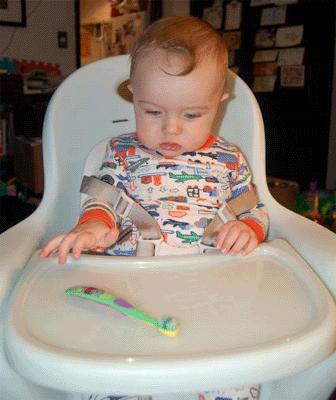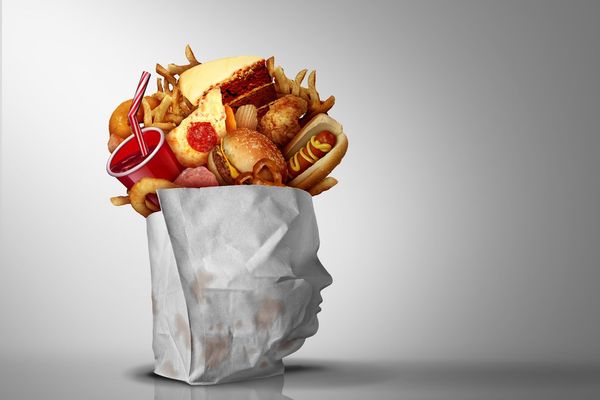Most parents of toddlers know that mealtimes can be stressful. You try to prepare the meal while hungry toddlers are melting down at your feet, then answer for the millionth time why there's no mac and cheese on the plate and, finally, try to keep your cool while your child throws food around. Your goal may quickly change from getting the kids fed to keeping your cool.
When you just want your child to be nourished and happy, it can be exhausting to feel like mealtime is like such a battle.
But don't worry. Take a deep breath and remember that the first several years of your kid's life are a very busy time developmentally. If you're exposing them to nutritious foods and they're not starving, try not to sweat it. The eating struggles are probably a phase.
Of course, if you think there's something deeper going on like textural aversions, extreme pickiness or inadequate weight gain, talk to your health care professional.
Otherwise, keep exposing your kids to varied foods and stay the course.
To help with those common toddler feeding frustrations, here are some tips from mom and registered dietitian Katie Serbinski of Mom to Mom Nutrition:
1) CHALLENGE: Picky eating and won't try new foods
SOLUTION: Most kids go through phases where they just don't want to eat anything new. If your decent eater is suddenly pushing new foods away or sticking to the same several foods, take a deep breath and wait to see if it's a phase. Maybe they're growing some painful teeth or going through some normal developmental anxieties around new experiences.
If the picky eating phase lasts for a while, Serbinski recommends serving a new food with a familiar one that they like. "If they're a big fan of blueberries and say no to raspberries, serve them together," she says.
Also, be the role model. "Get them involved in cooking and grocery shopping. In the produce section, talk about flavors, colors and textures. And ask questions: How would you rate this food? Have a bite and tell me, 'What do you think it would go with?'"
2) CHALLENGE: Cheese fiend
SOLUTION: Most kids love the cheese and carb meals like mac and cheese or grilled cheese. First, take an honest inventory of how often they're eating meals like this. Is it every single day? If yes, then try to do some simple meal planning to put several days between the cheese quesadilla and mac and cheese. Sneak in veggies to boost the health factor. And, as Serbinski suggests, serve something new alongside the food they like (in this case, cheese).
3) CHALLENGE: Won't eat breakfast before school
SOLUTION: This can get frustrating because you want your child to be comfortable when they go to school. You know better than anyone that when they're hungry, they're more likely to have behavioral issues. If your little kid pushes breakfast away, it might be time to revamp the meal. Cereal is easy in the morning, but it may have become too repetitive for your kid. Try mixing it up with yogurt, chia pudding parfait, cottage cheese, peanut butter toast or even leftovers! Breakfast doesn't have to be what we traditionally think of as breakfast food. Serbinski's mini muffins, banana breakfast bars or overnight oatmeal raisin bars are also a good idea to have prepared and on hand.
4) CHALLENGE: Snacks too much and won't eat a real meal
SOLUTION: Serbinski's rule of thumb is to eat meals at scheduled times and stick as close to the schedule as possible. "Do not offer a snack unless there are four or more hours until the next meal," she says. And before you give your kid a snack, see if you can divert their attention to reading a book, taking a walk or doing some other activity. Maybe they are bored rather than hungry. You'll know when they're actually hungry! Also, try to offer real, whole foods for snacks instead of sweet and salty treats that they will definitely ask for next time. Revamp snack time with Serbinski's list of 10 toddler snacks.
5) CHALLENGE: Manner issues, like throwing food
SOLUTION: If your child is 18 months or younger, the child isn't throwing food with the intent to misbehave. You child is likely trying to learn about cause and effect. But any child older than 18 months can learn that this behavior is not acceptable. If you notice that your child throws food near the end of the meal, it might mean he or she is full and doesn't need any more food. To minimize your frustration at how much food is on the floor, try limiting the amount of food you put on the tray.
Don't sweat it
Realize that forming a healthy eater will not happen overnight, and not every meal will go as planned. But keep exposing those little eaters to healthy, nutritious foods and one day you'll see that your efforts have paid off!
Read More:
8 Ways You Can Get Your Kid to Eat Vegetables
How to Help Your Child Break Their Bad Eating Habits
3 Healthy, Plant-Based, Kid-Friendly Recipes







